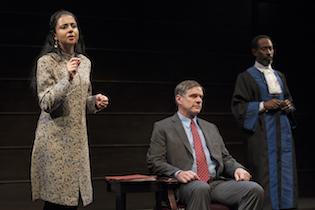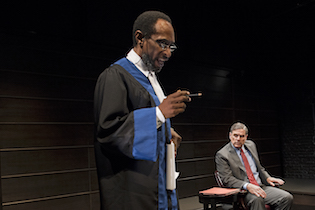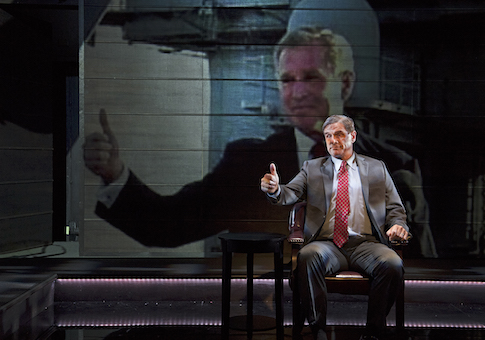NEW YORK, N.Y.—It took a few seconds for me and my companion to single out the Lion Theatre from a clutter of other venues on Theatre Row. Its facade was partly obscured by the construction scaffolding that is a constant presence in New York City. Just inside, I could see a woman with close-cropped hair and an old leather jacket buying a ticket from the box office. I suspected we were in the right place.
We were. A poster on the wall advertised the play we would be seeing, Trial of an American President. It depicted George Bush, walking with downcast eyes and hand in pocket, flanked by Donald Rumsfeld and Dick Cheney, who grinned wolfishly.
The play asks what if the United Nations Security Council—a body that includes the United States—referred Bush to the International Criminal Court for war crimes? And what if Bush decided to show up at this court, which has no police power? And further, what if he decided to represent himself at the trial, so it was just Bush wrangling mano a mano, pardner, with the blue-robed magi of The Hague?
Bush’s fate is decided during each performance by a majority decision of a nine-person jury selected from the audience. The problems with this method of trial are obvious. The play’s audience is self-selecting. Inevitably, it has strong prejudices about the events in question. Ironically, the bare majority required for conviction is a far looser standard than that used by the military commissions of terrorists that set liberal hair on fire in the early 2000s. The verdicts of this production have all the weight and impartiality of a Drudge poll.

I had been guaranteed a spot on the jury by the play’s P.R. flacks, so I sat near the front with a perforated ballot I had been handed at the door. It was divided into two sections: NOT GUILTY in white, GUILTY in red. There were about 70 people in the small theater. The audience was comprised mostly of people who, judging from their demeanor and dress, had kept the MoveOn.org flame alive in their hearts the past 15 years. Chatter before the play was subdued, casual, and quietly confident, as though this was a perfectly normal play and the outcome was not really in doubt, whatever ballot I had been given. They thought it would be a slam dunk, if you will.
The bulk of the production was devoted to three courtroom sessions about torture and other alleged war crimes during the invasion and occupation of Iraq. These acts were interspersed with video montages of the war, "witness" testimony, and soliloquies by George Bush (Tony Carlin) and the Narrator (Mahira Kakkar), who was the play’s arbiter and conscience.
The Prosecutor (Michael Rogers) was a slender man with a foreboding air, glasses positioned bookishly low on the bridge of his nose. He wore a fussy white jabot with his blue judge’s robes and spoke with the precision of a lawyer and moral conviction of an activist, interjecting into Bush’s testimony with biting sarcasm. Oh, is that so, President Bush? Well, well, President Bush. We will see about that, President Bush. After the play, my companion said Rogers should be commended for his acting: he had nailed the prim moralizing of a certain class of international bureaucrat.
Bush’s reaction to the charges against him was a mixture of bewilderment, indignation, and regret. He stumbled through his testimony in an oafish Texas vernacular, making familiar arguments—Saddam was a bad man, innocent people die in war, I am not a monster, etc.—but without the full force of facts or eloquence. Later, I asked playwright Dick Tarlow what research he had done for the play. He responded that he had read a dozen or so books from both pro- and anti-Bush perspectives, including George Bush’s memoir. I asked Tarlow which of Bush’s defenders he had read. "I can’t remember the names," he said.
Carlin’s portrayal of Bush was hammy and exaggerated like Will Ferrell’s, but with more self-doubt. He had "felt in his gut" that Iraq had WMD, but wondered aloud whether he had made the right call. He apologized tearfully to an angry mother who had lost her son in Iraq. Halfway through the play he prayed to God for guidance. The stage was washed in soft light during this soliloquy, representative, I suppose, of the ironic divine presence.

God was not the only Bush adviser to appear in the play. Over the phone, Laura Bush pleaded with her husband to come home in her sweet Southern accent. Tony Blair told Bush in an unconvincing British accent that they bore responsibility for ISIS’s rampage across the Middle East. Dick Cheney warned Bush that the court "just wanted to hang" him. "Maybe I should take them hunting with me," he said in an audience-pleasing line.
After an hour of this, it was time to vote. The narrator impressed upon the jury that a vote to acquit Bush could mean that posterity would judge him more kindly. A vote to convict, on the other hand, would send him to the brig of history. We should only vote to convict, she said, if we were convinced beyond a reasonable doubt that Bush was guilty of one of the crimes. Had he deceived us into Iraq to enrich his oil buddies? Had he ordered atrocities against Iraqi civilians? Had he encouraged the torture of enemy combatants or Iraqi prisoners of war? The jury was effectively being asked to decide whether Bush was a feckless moron (not guilty) or a cold-blooded criminal mastermind (guilty).
Here, I thought Carlin’s portrayal of Bush as a sincere idiot fueled by Jesus and patriotism would work in favor of the defense. Still, I was conscious that every jury prior to mine had chosen to convict. With grave purpose and furrowed brow, I contemplated my decision. After many "on the one hands" and "on the other hands," I tore off the white side of my ballot and submitted it with solemn ceremony.
The narrator counted the ballots with her back turned to the audience, then turned to us to announce the verdict. It seemed to me that she was suppressing a look of amusement.
"By a vote of 7 to 2, George Bush is found … not guilty."
There was silence from the audience, followed by a smattering of incredulous laughter. Then, a one-word lament rose from the back of the darkened room. I can only describe it as the lament of a man betrayed by conspirators he had thought of as friends. "GUILLLLLLTYYYY," groaned this dying Caesar.
When the verdict was handed down, Bush’s face lit up with a smile of born-again, up-from-baptismal-waters redemption. According to my companion, it was a "shit-eating grin," an interpretation I will allow. "Fortunate Son" by Creedence Clearwater Revival blared as the play drew to a close.
After the show I was approached by a juror who presumably had noticed me flashing Bush the "Mission Accomplished" thumbs up during the curtain call. He volunteered that he had been one of the two votes to convict. I asked him if he thought the play was a fair portrayal of the events. He responded that it was a bit "sensationalized," but that the general thrust was all right. We talked civilly for the next fifteen minutes or so about all manner of things: his one-time job as an Amtrak lobbyist, his support for Bernie Sanders and distrust for Hillary Clinton ("I don’t think I can pull the lever for her"). He had watched the September 11 terrorist attacks from his office window, but turned against the Iraq war because of its remote connection to that attack.
I suggested to him that 9/11 had been a wakeup call about imminent threats to the homeland, which informed our decision to invade Iraq but was not decisive in that decision. We agreed to disagree. Did he think that this kind of play was good for America? He responded that he hoped it would contribute to a dialogue about solving the country’s problems. Given how long we had been talking in the doorway of the men’s restroom, maybe he had a point.
